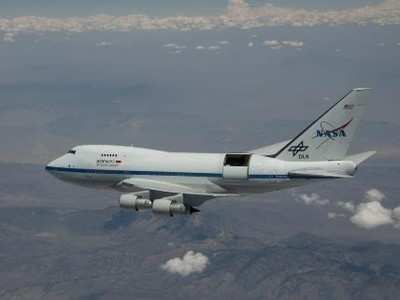Sun, Apr 22, 2012
Hi-Res Airborne Wideband Camera To Fly On SOFIA Aircraft
NASA has selected a science instrument upgrade to the Stratospheric Observatory for Infrared Astronomy (SOFIA) airborne observatory. The instrument, the High-resolution Airborne Wideband Camera (HAWC), will provide a sensitive, versatile and reliable imaging capability to the SOFIA user community. The upgrade involves two proposals that will allow the observatory to measure the structure and strength of magnetic fields in diverse objects throughout the universe, such as star-forming clouds and galaxies. This will help astronomers better understand how stars, planets and galaxies form and evolve.

SOFIA is a highly modified Boeing 747SP aircraft that carries a telescope with a 100-inch (2.5-meter) diameter reflecting mirror that conducts astronomy research not possible with ground-based telescopes. By operating in the stratosphere at altitudes up to 45,000 feet, SOFIA can make observations above the water vapor in Earth's lower atmosphere. "SOFIA has the ability to become a world-class airborne observatory that complements the Hubble, Spitzer and Herschel space telescopes," said John Grunsfeld, NASA's Science Mission Directorate associate administrator. "This upgrade will greatly broaden SOFIA's capabilities."
Last August, the agency released an Announcement of Opportunity for SOFIA second-generation instrument investigations and received 11 proposals. The selected proposals were judged to have the best science value and feasible development plans.
The selected proposals are:
- The High-resolution Airborne Wideband Camera Polarization (HAWC-Pol), Charles Dowell, principal investigator, NASA's Jet Propulsion Laboratory, Pasadena, CA. This investigation upgrades the HAWC instrument to include the capability to make polarimetric observations at far-infrared wavelengths. The investigation's main goals are to measure the magnetic field in the interstellar medium, star forming regions and the center of the Milky Way.
- HAWC++, Johannes Staguhn, Johns Hopkins University, Baltimore, MD. This investigation will provide a sensitive, large-format detector array to the HAWC-Pol investigation, increasing its observing efficiency and providing a broader range of targets.
(Image provided by NASA)
More News
Option Approach An approach requested and conducted by a pilot which will result in either a touch-and-go, missed approach, low approach, stop-and-go, or full stop landing. Pilots >[...]
"Emirates is already the world's largest Boeing 777 operator, and we are expanding our commitment to the program today with additional orders for 65 Boeing 777-9s. This is a long-t>[...]
(Pilot) Reported That There Was A Sudden And Violent Vibration Throughout The Airplane That Lasted Several Seconds Analysis: The pilot was returning to his home airport at an altit>[...]
“This recognition was evident during the TBMOPA Annual Convention, where owners and operators clearly expressed their satisfaction with our focus on customer service, and enc>[...]
Overhead Maneuver A series of predetermined maneuvers prescribed for aircraft (often in formation) for entry into the visual flight rules (VFR) traffic pattern and to proceed to a >[...]
 ANN's Daily Aero-Term (11.19.25): Option Approach
ANN's Daily Aero-Term (11.19.25): Option Approach Aero-News: Quote of the Day (11.19.25)
Aero-News: Quote of the Day (11.19.25) NTSB Final Report: Sting Sport TL-2000
NTSB Final Report: Sting Sport TL-2000 Aero-News: Quote of the Day (11.20.25)
Aero-News: Quote of the Day (11.20.25) ANN's Daily Aero-Term (11.20.25): Overhead Maneuver
ANN's Daily Aero-Term (11.20.25): Overhead Maneuver



